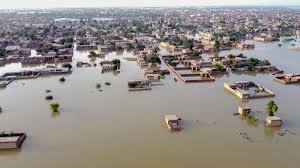
India shows greatness: For the first time after Operation Sindoor, Pakistan is warned of the flood crisis
New Delhi, August 25, 2025: In the backdrop of tense relations between India and Pakistan, India has taken a significant step on humanitarian grounds. According to the Ministry of External Affairs, India has alerted Pakistan about the possible flooding in the Tawi river. This is the first official interaction between the two countries after Operation Sindoor, which has given this incident special significance.
Operation Sindoor and tense relations
On April 22, 2025, 26 civilians were killed in a terrorist attack in Pahalgam, Jammu and Kashmir. India launched 'Operation Sindoor' on May 7, 2025 against the Pakistan-based terrorist groups responsible for this attack. In this operation, India attacked nine terrorist camps in Pakistan and Pakistan-occupied Kashmir. This operation further strained relations between the two countries. Tensions between the two countries had reached a peak after India temporarily suspended the Indus Water Treaty and Pakistan rejected the Shimla Agreement.
Against this backdrop, India has shown a humanitarian approach by alerting Pakistan about the possible flooding in the Tawi river. This information was given to Pakistan through diplomatic channels, due to which Pakistani authorities have issued an alert in sensitive areas.
India's role on humanitarian grounds
The Ministry of External Affairs has clarified that this warning has been given purely on humanitarian grounds. "Our policy has always been to maintain peace and stability. We shared this information so that the common people of Pakistan do not suffer due to the flood crisis," said External Affairs Ministry Spokesperson Randhir Jaiswal.
With this incident, India has not only shown its responsible and mature role, but also expressed a sense of cooperation with its neighboring countries. The flooding of the Tawi river was likely to cause extensive damage in some parts of Pakistan, especially the Muzaffarabad area of ??Pakistan-occupied Kashmir. India's alertness enabled the Pakistani administration to take timely measures.
Floods in Pakistan and allegations against India
Earlier, in April 2025, Pakistan had accused India of releasing water into the Jhelum River and causing floods in Pakistan-occupied Kashmir. However, experts and weather reports refuted these allegations, stating that the floods were caused by seasonal snowmelt and heavy rains. With India alerting Pakistan on its own, such allegations are unlikely to be substantiated.
Pakistan has been hit by massive floods this year due to heavy rains and sudden cloudbursts during the monsoon season. At least 321 people have died in the last 48 hours in Khyber Pakhtunkhwa province, while the death toll across the country is over 300. India's alertness will help rescue operations and measures in flood-affected areas of Pakistan to be carried out more effectively.
First dialogue after Operation Sindoor
This is the first official dialogue between India and Pakistan after Operation Sindoor, which gives the incident special significance from a political and diplomatic point of view. During Operation Sindoor, India carried out precision strikes on terrorist camps, in which more than 100 terrorists were killed and 11 air bases in Pakistan were destroyed. Tensions between the two countries had increased after this operation, and Pakistan had retaliated by claiming to have attacked India.
However, the flood alert has opened up new possibilities for dialogue between the two countries. Experts say that this step by India may help reduce tensions to some extent in the future. "This is a positive message. This humanitarian role shown by India can help build trust between the two countries," said senior political analyst Prof. Ali Khan.
Future directions and expectations
India has often presented its peaceful and responsible role to the world in the past. During Operation Sindoor, India only attacked terrorist camps and did not target Pakistani military or civilian sites, which is a sign of India's policy of restraint. Also, with this flood alert, India has once again established its humanitarian image at the global level.
An official response from Pakistan is yet to come, but local Pakistani news agencies have welcomed India's move. The process of dialogue between the two countries is likely to move forward in the coming days, especially on humanitarian issues.
New Delhi, August 25, 2025: In the backdrop of tense relations between India and Pakistan, India has taken a significant step on humanitarian grounds. According to the Ministry of External Affairs, India has alerted Pakistan about the possible flooding in the Tawi river. This is the first official interaction between the two countries after Operation Sindoor, which has given this incident special significance.
Operation Sindoor and tense relations
On April 22, 2025, 26 civilians were killed in a terrorist attack in Pahalgam, Jammu and Kashmir. India launched 'Operation Sindoor' on May 7, 2025 against the Pakistan-based terrorist groups responsible for this attack. In this operation, India attacked nine terrorist camps in Pakistan and Pakistan-occupied Kashmir. This operation further strained relations between the two countries. Tensions between the two countries had reached a peak after India temporarily suspended the Indus Water Treaty and Pakistan rejected the Shimla Agreement.
Against this backdrop, India has shown a humanitarian approach by alerting Pakistan about the possible flooding in the Tawi river. This information was given to Pakistan through diplomatic channels, due to which Pakistani authorities have issued an alert in sensitive areas.
India's role on humanitarian grounds
The Ministry of External Affairs has clarified that this warning has been given purely on humanitarian grounds. "Our policy has always been to maintain peace and stability. We shared this information so that the common people of Pakistan do not suffer due to the flood crisis," said External Affairs Ministry Spokesperson Randhir Jaiswal.
With this incident, India has not only shown its responsible and mature role, but also expressed a sense of cooperation with its neighboring countries. The flooding of the Tawi river was likely to cause extensive damage in some parts of Pakistan, especially the Muzaffarabad area of ??Pakistan-occupied Kashmir. India's alertness enabled the Pakistani administration to take timely measures.
Floods in Pakistan and allegations against India
Earlier, in April 2025, Pakistan had accused India of releasing water into the Jhelum River and causing floods in Pakistan-occupied Kashmir. However, experts and weather reports refuted these allegations, stating that the floods were caused by seasonal snowmelt and heavy rains. With India alerting Pakistan on its own, such allegations are unlikely to be substantiated.
Pakistan has been hit by massive floods this year due to heavy rains and sudden cloudbursts during the monsoon season. At least 321 people have died in the last 48 hours in Khyber Pakhtunkhwa province, while the death toll across the country is over 300. India's alertness will help rescue operations and measures in flood-affected areas of Pakistan to be carried out more effectively.
First dialogue after Operation Sindoor
This is the first official dialogue between India and Pakistan after Operation Sindoor, which gives the incident special significance from a political and diplomatic point of view. During Operation Sindoor, India carried out precision strikes on terrorist camps, in which more than 100 terrorists were killed and 11 air bases in Pakistan were destroyed. Tensions between the two countries had increased after this operation, and Pakistan had retaliated by claiming to have attacked India.
However, the flood alert has opened up new possibilities for dialogue between the two countries. Experts say that this step by India may help reduce tensions to some extent in the future. "This is a positive message. This humanitarian role shown by India can help build trust between the two countries," said senior political analyst Prof. Ali Khan.
Future directions and expectations
India has often presented its peaceful and responsible role to the world in the past. During Operation Sindoor, India only attacked terrorist camps and did not target Pakistani military or civilian sites, which is a sign of India's policy of restraint. Also, with this flood alert, India has once again established its humanitarian image at the global level.
An official response from Pakistan is yet to come, but local Pakistani news agencies have welcomed India's move. The process of dialogue between the two countries is likely to move forward in the coming days, especially on humanitarian issues.
Operation Sindoor and tense relations
On April 22, 2025, 26 civilians were killed in a terrorist attack in Pahalgam, Jammu and Kashmir. India launched 'Operation Sindoor' on May 7, 2025 against the Pakistan-based terrorist groups responsible for this attack. In this operation, India attacked nine terrorist camps in Pakistan and Pakistan-occupied Kashmir. This operation further strained relations between the two countries. Tensions between the two countries had reached a peak after India temporarily suspended the Indus Water Treaty and Pakistan rejected the Shimla Agreement.
Against this backdrop, India has shown a humanitarian approach by alerting Pakistan about the possible flooding in the Tawi river. This information was given to Pakistan through diplomatic channels, due to which Pakistani authorities have issued an alert in sensitive areas.
India's role on humanitarian grounds
The Ministry of External Affairs has clarified that this warning has been given purely on humanitarian grounds. "Our policy has always been to maintain peace and stability. We shared this information so that the common people of Pakistan do not suffer due to the flood crisis," said External Affairs Ministry Spokesperson Randhir Jaiswal.
With this incident, India has not only shown its responsible and mature role, but also expressed a sense of cooperation with its neighboring countries. The flooding of the Tawi river was likely to cause extensive damage in some parts of Pakistan, especially the Muzaffarabad area of ??Pakistan-occupied Kashmir. India's alertness enabled the Pakistani administration to take timely measures.
Floods in Pakistan and allegations against India
Earlier, in April 2025, Pakistan had accused India of releasing water into the Jhelum River and causing floods in Pakistan-occupied Kashmir. However, experts and weather reports refuted these allegations, stating that the floods were caused by seasonal snowmelt and heavy rains. With India alerting Pakistan on its own, such allegations are unlikely to be substantiated.
Pakistan has been hit by massive floods this year due to heavy rains and sudden cloudbursts during the monsoon season. At least 321 people have died in the last 48 hours in Khyber Pakhtunkhwa province, while the death toll across the country is over 300. India's alertness will help rescue operations and measures in flood-affected areas of Pakistan to be carried out more effectively.
First dialogue after Operation Sindoor
This is the first official dialogue between India and Pakistan after Operation Sindoor, which gives the incident special significance from a political and diplomatic point of view. During Operation Sindoor, India carried out precision strikes on terrorist camps, in which more than 100 terrorists were killed and 11 air bases in Pakistan were destroyed. Tensions between the two countries had increased after this operation, and Pakistan had retaliated by claiming to have attacked India.
However, the flood alert has opened up new possibilities for dialogue between the two countries. Experts say that this step by India may help reduce tensions to some extent in the future. "This is a positive message. This humanitarian role shown by India can help build trust between the two countries," said senior political analyst Prof. Ali Khan.
Future directions and expectations
India has often presented its peaceful and responsible role to the world in the past. During Operation Sindoor, India only attacked terrorist camps and did not target Pakistani military or civilian sites, which is a sign of India's policy of restraint. Also, with this flood alert, India has once again established its humanitarian image at the global level.
An official response from Pakistan is yet to come, but local Pakistani news agencies have welcomed India's move. The process of dialogue between the two countries is likely to move forward in the coming days, especially on humanitarian issues.

.jpg)
















